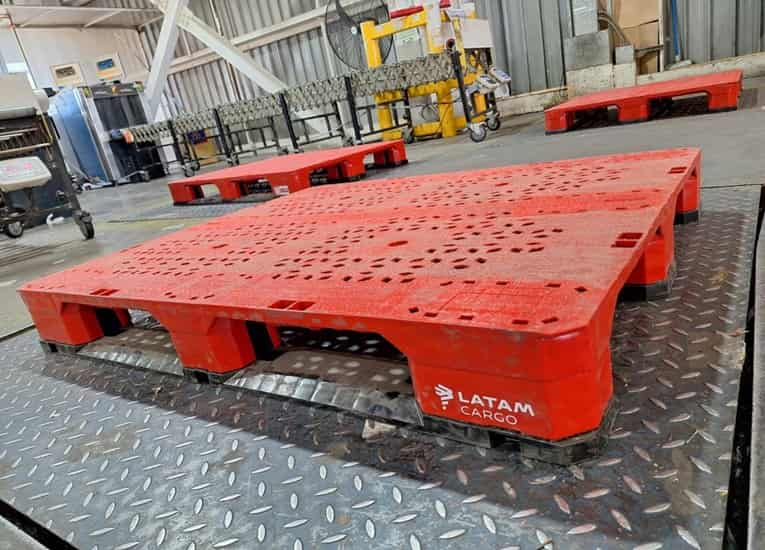In a groundbreaking move towards sustainability, LATAM Cargo Group in Chile has introduced recycled plastic pallets to replace conventional wooden and plastic pallets used in their cargo operations. These innovative pallets are more resistant, durable, and environmentally friendly, marking a significant step in the company’s journey towards achieving zero waste to landfill by 2027.
A Commitment to Sustainability
The transition to recycled plastic pallets aligns with LATAM Cargo Group’s broader sustainability goals. Currently, bulk cargo is transported from warehouses to aircraft using either plastic or wooden pallets. However, for domestic cargo operations in Chile, these have now been replaced with high-density recycled plastic pallets, which boast a lifespan of approximately a decade—far longer than traditional options.
“Sustainability is a priority for LATAM Cargo Group, and the shift to recycled materials like plastic pallets reflects our commitment to the circular economy and our goal of becoming a zero-waste-to-landfill group by 2027,” says Cristina Oñate, Senior Manager of Sustainability and Product at LATAM Cargo Group. “This initiative complements other sustainable practices in our operations, such as replacing single-use plastic with reusable blankets or recyclable tape.”
Advantages of Recycled Plastic Pallets
Manufactured by REHRIG PACIFIC COMPANY, these pallets are composed of high-density polyethylene (HDPE), with 50% made from recycled materials such as used boxes and the remaining 50% from virgin plastic. This combination enhances their strength and durability, making them a superior alternative to traditional wooden and plastic pallets.
Key benefits of these recycled plastic pallets include:
- Enhanced Durability: With a lifespan of about ten years, these pallets significantly outlast conventional options, reducing the need for frequent replacements.
- Improved Hygiene: Unlike wooden pallets, they do not harbor fungi or bacteria, making them a cleaner choice for cargo operations.
- Lightweight and Strong: These pallets are lighter yet more robust, minimizing maintenance costs and improving efficiency.
- Distinctive Design: The pallets are uniquely red, a color derived from the recycled material. This distinctive hue not only facilitates their identification but also enhances their returnability, making LATAM Cargo Group the only operator in Chile using this design.
- Anti-Slip Structure: The pallets’ non-slip surface reduces the risk of cargo displacement, even under extreme temperatures ranging from -20°C to 60°C.
Expanding the Initiative
Given the operational and environmental advantages of recycled plastic pallets, LATAM Cargo Group plans to expand this initiative to other cities within their domestic cargo network. Additionally, they are evaluating the feasibility of implementing recycled plastic pallets in other South American operations, including Peru, Ecuador, Colombia, and Brazil.
Supporting a Circular Economy
The adoption of these pallets is a significant step in LATAM Cargo Group’s commitment to a circular economy. By incorporating recycled materials into their operations, the company reduces waste and promotes resource efficiency. This approach aligns with global sustainability trends, where businesses are increasingly adopting practices that minimize their environmental footprint.
LATAM Cargo Group’s transition to recycled plastic pallets is more than an operational upgrade; it’s a testament to their dedication to sustainability. By embracing innovative materials and processes, the company is setting a benchmark for the logistics industry in environmental responsibility. As LATAM expands this initiative across South America, it reinforces the message that sustainable practices are not only beneficial for the planet but also for business efficiency and long-term success.

